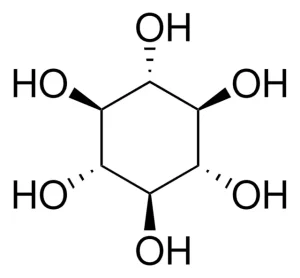
Inositol is a naturally occurring carbohydrate that plays a crucial role in various biological processes in the body. It is often classified as a pseudovitamin due to its importance in cellular signaling and its involvement in the formation of phospholipids, which are essential components of cell membranes. Inositol is found in many foods, particularly in fruits, beans, grains, and nuts, and it is also available as a dietary supplement.
From a health perspective, inositol has garnered attention for its potential benefits in several areas, particularly concerning metabolic health and mental well-being. One of the most significant applications of inositol is in the management of polycystic ovary syndrome (PCOS), a hormonal disorder that affects many women of reproductive age. Research has shown that inositol can improve insulin sensitivity and help regulate menstrual cycles in women with PCOS. By enhancing ovarian function and reducing insulin resistance, inositol may help alleviate some of the symptoms associated with this condition, such as irregular periods and fertility issues.
In addition to its benefits for women with PCOS, inositol has been studied for its effects on metabolic syndrome—a cluster of conditions that increase the risk of heart disease, stroke, and diabetes. Studies indicate that inositol supplementation can lead to improvements in various metabolic markers, including reductions in blood triglycerides, cholesterol levels, and blood pressure. For individuals struggling with weight management or those at risk for type 2 diabetes, incorporating inositol into their regimen may provide valuable support for achieving better metabolic health.
Moreover, inositol’s role extends to mental health as well. It has been investigated for its potential effects on mood disorders, including anxiety and depression. Some studies suggest that inositol may help reduce symptoms of anxiety by influencing serotonin signaling—a neurotransmitter that plays a critical role in regulating mood. While more research is needed to fully understand its efficacy in treating anxiety disorders, the preliminary findings are promising and highlight the potential of inositol as a complementary approach to mental health support.
Inositol is also recognized for its potential benefits during pregnancy. Some studies have indicated that it may reduce the risk of gestational diabetes—a condition characterized by high blood sugar levels during pregnancy. By improving insulin sensitivity, inositol could play a role in promoting healthier blood sugar levels during this critical period. However, while initial findings are encouraging, further research is necessary to establish definitive guidelines for its use during pregnancy.
The safety profile of inositol is generally favorable when taken at recommended doses. It is considered safe for most adults when used appropriately and does not have a high risk of toxicity since it is water-soluble. Common side effects are typically mild and may include gastrointestinal discomfort such as nausea or diarrhea, particularly at higher doses exceeding 12 grams per day. Therefore, individuals interested in using inositol should consult with healthcare professionals to determine appropriate dosages tailored to their specific needs.
In terms of supplementation, myo-inositol and D-chiro-inositol are two forms commonly found in dietary products. Research suggests that a combination of these two forms may be particularly effective for managing PCOS and improving insulin sensitivity. When selecting an inositol supplement, it is crucial to choose high-quality products from reputable manufacturers to ensure safety and efficacy.
As interest continues to grow regarding the potential health benefits of inositol, ongoing research will likely uncover additional applications for this versatile compound. Its multifaceted roles—from supporting metabolic health and enhancing fertility to promoting mental well-being—make it an attractive option for individuals seeking natural ways to optimize their health.
In conclusion, inositol stands out as a valuable dietary supplement with numerous potential benefits across various aspects of health. Its ability to support metabolic function, improve reproductive health, and contribute positively to mental well-being makes it an appealing choice for many individuals looking to enhance their overall quality of life. By integrating inositol into a balanced diet and lifestyle—alongside regular exercise and proper nutrition—individuals can take proactive steps toward achieving their health goals while benefiting from the unique properties this compound offers.
As research continues to shed light on the diverse effects of inositol, it remains an exciting area within the realm of dietary supplements. By embracing the potential of this natural compound, individuals can harness its benefits as part of their journey toward optimal health and wellness.
Need your own dietary supplement manufacturer? Extremely competitive rates. We produce it all. Talk to us.
Comments are closed